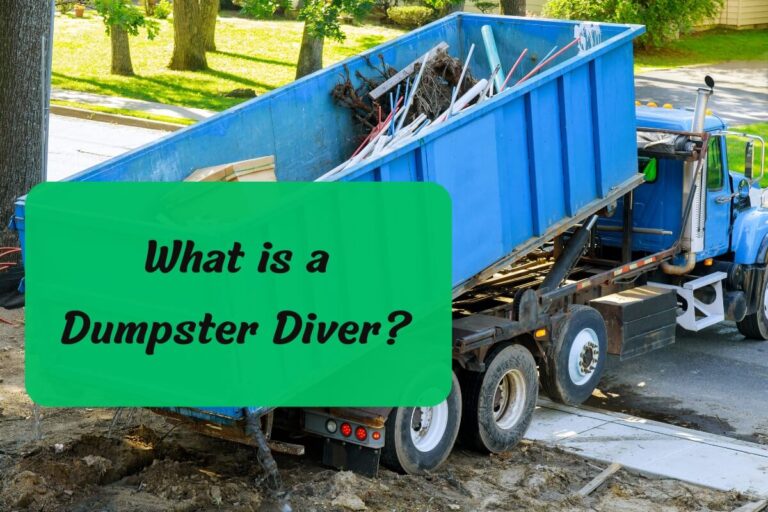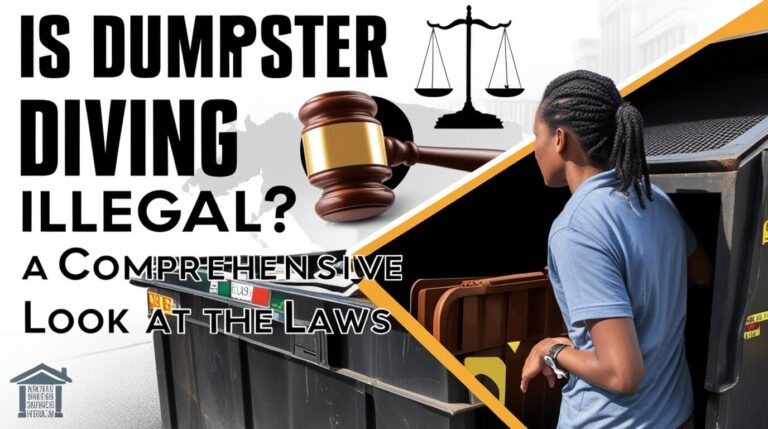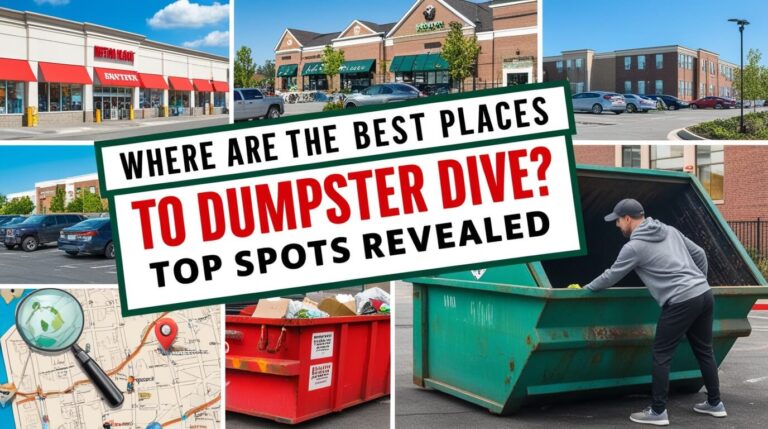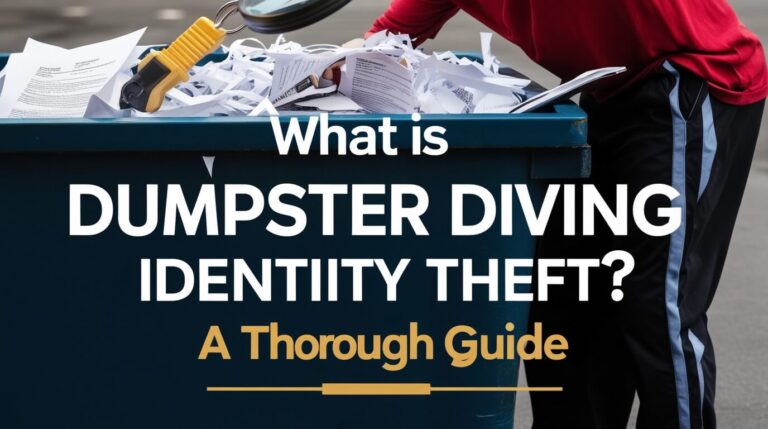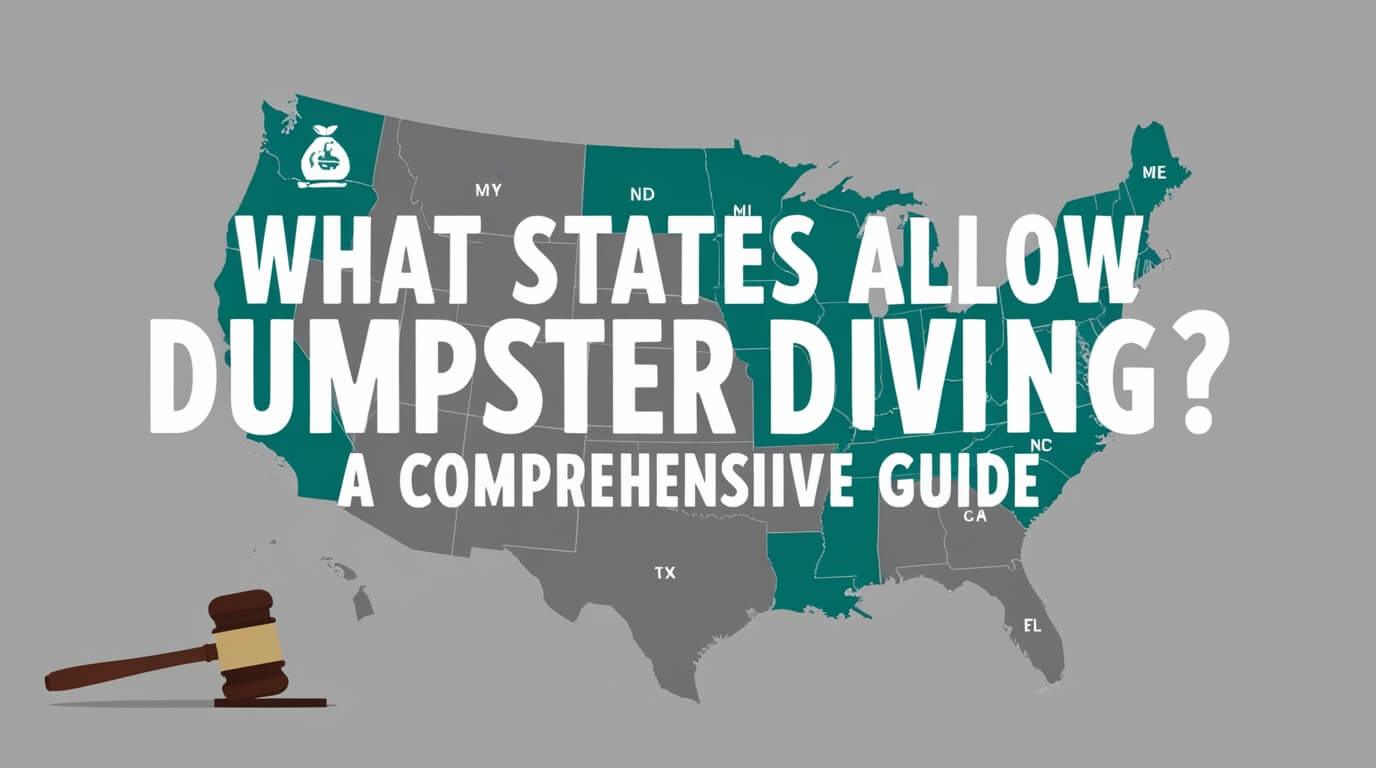
In our consumerist society, it’s no secret that a staggering amount of perfectly usable items end up in landfills or incinerators. From clothing and furniture to electronics and even food, the waste we generate is truly astonishing. However, there’s a growing movement of individuals who have taken it upon themselves to reduce this waste by engaging in a practice known as “dumpster diving.”
Dumpster diving, or the act of searching through commercial or residential trash receptacles for discarded items of value, has become a way for some to find free or low-cost goods, while others see it as an eco-conscious effort to combat waste and promote sustainability. But is this practice legal? The short answer is: yes, dumpster diving is generally legal in most states, but there are nuances and local regulations that must be considered.
In this complete guide, we’ll explore the legality of dumpster diving across all 50 states, potential legal consequences, best practices for safe and ethical diving, and the environmental and economic impacts of this unconventional activity.
Understanding the Legality of Dumpster Diving
The legality of dumpster diving in the United States primarily hinges on two key factors: trespassing laws and the expectation of privacy for discarded items. In the seminal 1988 Supreme Court case, California v. Greenwood, the court ruled that individuals do not have a reasonable expectation of privacy for trash left outside for collection. This ruling effectively legitimized dumpster diving on a broad federal level.
Federal law allows dumpster diving, but states and cities can ban it. Most states lack specific laws, but trespassing laws apply if divers enter private property without permission.
State-by-State Guide to Dumpster Diving Laws
To provide a comprehensive overview, here’s a state-by-state breakdown of the legality of dumpster diving as of 2024:
- Alabama: Legal, with local ordinances
- Alaska: Legal
- Arizona: Legal
- Arkansas: Legal
- California: Legal, with city bans
- Colorado: Legal, with local restrictions
- Connecticut: Legal
- Delaware: Legal
- Florida: Legal, with city restrictions
As you can see, dumpster diving is generally allowed in most states, but it’s essential to research and follow any local ordinances or regulations that may prohibit or restrict the practice in specific areas or circumstances.
Potential Legal Consequences of Dumpster Diving
While dumpster diving itself may not be inherently illegal in most states, there are potential legal consequences that divers should be aware of:
- Trespassing: If you enter private property, such as the area behind a store or a fenced-off enclosure, without permission, you could be charged with trespassing. Always check for “No Trespassing” signs and seek permission from property owners when necessary.
- Theft of Recyclables: In some cities and states, such as New York City, it is illegal to take recyclable materials that have been placed on the curb for collection by municipal services. These items are considered the property of the city or state.
- Local Ordinances: Some municipalities have specific ordinances that prohibit or regulate dumpster diving, such as requiring permits or restricting the practice in certain areas. It’s crucial to research and comply with local laws and regulations.
Failure to adhere to these laws and regulations can result in fines, citations, or even arrest in some cases. It’s always better to be cautious and respectful of private property and local laws when engaging in dumpster diving.
Best Practices for Safe and Legal Dumpster Diving
To dumpster dive safely and legally, follow these best practices:
- Research Local Laws: Before diving, research the specific laws and ordinances in your area to ensure you’re not inadvertently breaking any rules.
- Seek Permission: If you plan to dive in dumpsters on private property, it’s always wise to seek permission from the property owner or manager beforehand.
- Stay Safe: Wear protective gear like gloves, closed-toe shoes, and long sleeves to avoid cuts, scrapes, or exposure to hazardous materials. Be cautious of sharp objects, chemicals, or potentially dangerous items.
- Respect Private Property: Never force entry into locked or fenced-off areas, and avoid causing any disturbances or damage to property.
- Leave No Trace: If you make a mess while diving, be sure to clean up after yourself and leave the area as you found it.
- Be Discreet: Avoid drawing unnecessary attention to yourself or causing disruptions that could lead to complaints or legal issues.
By following these best practices, you can engage in dumpster diving responsibly and ethically, minimizing the risk of legal consequences or safety hazards.
Environmental and Economic Impacts of Dumpster Diving
Dumpster diving is not just a means of acquiring free or low-cost goods; it also has significant environmental and economic implications:
- Waste Reduction: By salvaging and reusing discarded items, dumpster divers help reduce the amount of waste that ends up in landfills or incinerators, minimizing the environmental impact of waste disposal.
- Resource Conservation: Every product requires raw materials, energy, and water to manufacture. Reusing discarded items conserves these valuable resources and reduces the demand for new production.
- Greenhouse Gas Emissions: Manufacturing processes and waste decomposition in landfills contribute significantly to greenhouse gas emissions. Dumpster diving helps curb these emissions by reducing the need for new production and minimizing waste.
- Local Economic Stimulation: Many dumpster divers sell or trade their finds, injecting goods and money into local economies. This activity can foster a sense of community and support small businesses or individuals.
- Job Creation: The rise of upcycling businesses, which refurbish and resell reclaimed items, has created new economic opportunities and jobs in various communities.
- Cost Savings: By reducing the amount of waste generated, municipalities can potentially save on waste management and disposal costs, freeing up funds for other community projects.
Dumpster diving has a positive impact on sustainability and local economies when done responsibly.
Frequently Asked Questions about Dumpster Diving
What are the best times and locations for dumpster diving?
The best times vary, but generally, evenings and early mornings are ideal, as dumpsters are often freshly filled or emptied during these times.
Popular locations include residential areas (particularly after move-outs or spring cleaning), retail stores, restaurants, and construction sites.
What types of items can be found while dumpster diving?
Common finds include furniture, electronics, clothing, books, appliances, building materials, and even food from grocery stores or restaurants.
How should I handle potentially valuable or personal items?
If you come across items that appear to be valuable or contain personal information, it’s best to leave them or report them to the appropriate authorities.
Is it safe to consume food found in dumpsters?
While some divers do consume discarded food, it’s essential to exercise caution and good judgment. Only take sealed, non-perishable items, and inspect them thoroughly for any signs of contamination or damage.
Can I sell items found while dumpster diving?
In most cases, yes. Once an item has been discarded, it is generally considered abandoned property and can be legally sold or traded.
Remember, these are general guidelines, and it’s always best to research and comply with local laws and regulations specific to your area.

